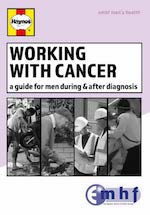The first-ever guide to help men to keep working during or after a cancer diagnosis has been published.
Working With Cancer from the European Men’s Health Forum is a short 12-page booklet that answers all the questions that working men whether employed, self-employed or freelance have when cancer strikes.
 How do we know? Because the booklet was written by a working man with cancer (the award-winning editor of the Men's Health Forum's website Jim Pollard), developed with a steering group including working men with cancer and read and commented on by working men with cancer. It also addresses the employer’s perspective, the legal position and related matters around money and general health.
How do we know? Because the booklet was written by a working man with cancer (the award-winning editor of the Men's Health Forum's website Jim Pollard), developed with a steering group including working men with cancer and read and commented on by working men with cancer. It also addresses the employer’s perspective, the legal position and related matters around money and general health.
EMHF President Dr Ian Banks who chaired the project said: ‘there’s lots of information about living with cancer out there but little of it is targeted at men. Clearly is an area such as work which is so important to men this is a gap that we were determined to fill. More and more of us will be working with and after a cancer diagnosis. It’s a challenging thing to do as all those involved in producing this guide know but Working With Cancer will make the challenge a little easier.’
Men with cancer value work
Dame Carol Black, who addressed the symposium that launched the project said: ‘when asked, most men with or surviving cancer, still value work. With longer life expectancy, rising incidence of cancer with an increased survival, more of these men will be seeking a return to the workplace. ‘This is good news, not only for the men themselves - we know that worklessness is at least as dangerous to health as smoking - it also makes sense for society. Enabling those men who wish to return to work with and despite cancer will be facilitated by this tool from the European Men’s Health Forum.’
The booklet was developed using grants from the Burdett Trust and Bristol-Myers Squibb (BMS). The Burdett Trust for Nursing said: ‘We are delighted to support this pioneering initiative in men’s cancer health. We know how important work is to men and how important it can be to their recovery from cancer. ‘Our Trustees selected the theme of 'Men's Health and Emergent Longer-term Conditions' for their focused 2016 Grants Programme because it is well known that men's health outcomes are substantially worse than women’s. The Trustees are interested in supporting nurse-led projects that will help to define proactive strategies and interventions that promote better self-care and reverse the negative impact that undetected and untreated men's longer-term health challenges may impart. This project did that precisely.’
Support from across Europe
The full Editorial Advisory Board for Working With Cancer was: Prof. Ian Banks, EMHF President; Dr. Steve Boorman, Director of Employee Health for Empactis and Honorary Professorial Fellow of the Royal Society of Public Health; Tracy Herd, Independent Health Improvement Specialist, EMHF; Dr. Briege Lagan, Lecturer in Nursing & Public Health, Ulster University; Prof. Eilis McCaughan, Professor in Cancer Care, Ulster University and men with cancer Raymond Bothwell, Brian Conway and Pat Hamill.
As well as the sponsors Burdett Trust for Nursing and BMS, the project has been supported by: Association of European Cancer Leagues (ECL), British Journal of Nursing, BT, Burdett Trust for Nursing, Cancer Black Care, Cancer Focus Northern Ireland, CHAPS – The Men’s Health Charity, Empactis, Europa Uomo, European CanCer Organisation (ECCO), European Oncology Nursing Society (EONS), European Association of Urology, European Association of Urology Nurses, European Cancer Concord, Faculty of Occupational Medicine, Haynes, Men’s Health Forum (UK), Men’s Health Forum Ireland, NHS Health at Work Network, Queens University Belfast, Royal College of Nursing, Self Care Forum, SCIE, SE Health and Social Care Trust, South Bank University, Tackle prostate cancer and Ulster University.
Dame Carol Black is principal of Newnham College, Cambridge. From 2006 to 2016, she advised the UK Government on the relationship between work and health.
